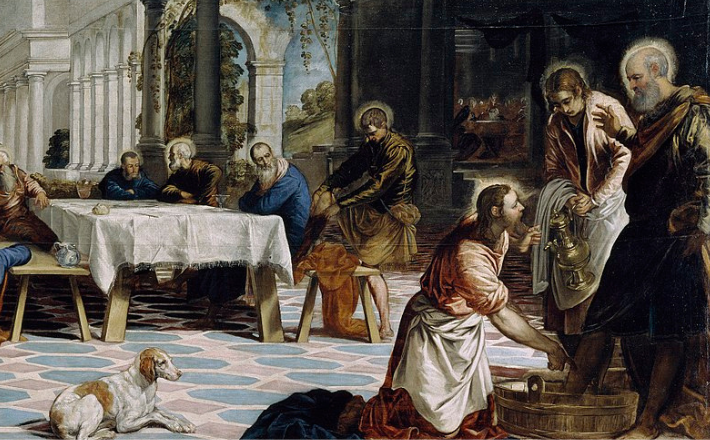Commentary on 1 Corinthians 11:23-26
Is the church, or the body of Christ—then and now—in urgent need of corrective lenses? The Corinthian church was overruled by a culture of selfishness and failed to proclaim the meaning of the gospel to all humanity. The 21st-century global church has fallen short in proclaiming the meaning of the Lord’s death and resurrection as well. Issues of individualism, power dynamics, biases, and exclusion have brought trauma, sorrow, and anguish to the body of Christ. Hence, the question of corrective lenses can be answered by an affirmative response.
Theologically and ecclesially speaking, the fault is not about the body of Christ or the Lord’s Supper, but it is about human beings who have failed to share the love of Jesus Christ with the “other.” With this background, we can appreciate Paul’s appeal to the value, role, and function of the Lord’s Table as a space for solidarity, love, and community building.
When church members lose sight of God’s mission and gospel, and develop the inability to hear the voice of the Holy Spirit, a plethora of issues such as schisms, splinters, cults, cliques, selfishness, complacency, assimilation, and idolatry will take over the entire life of the church. Such is the impetus of apostle Paul’s writings to the Corinthian church. Paul the founder, pastor, and perhaps overseer of the Corinthians intentionally responds to all the problems by offering divine corrective lenses for viewing Christian conduct in the partaking of the Lord’s Supper. Breaking bread and sharing the blood of Jesus is intended to foster solidarity and hospitality among worshipers.
Instead, the Corinthians, like any other cultural human beings, were abusing the Lord’s Supper. Social discrimination and alienation of the poor were taking place during communion. The vulnerable ones and the ones who had social stigma were made to be invisible (11:22). Power dynamics and elitism had taken over the communal heart of the gospel. True salvation is about the transformation of the human condition, which in many cases is characterized by chronic brokenness. In a Corinthian-like culture, those in power live with an assumption that they must strive at the expense of the poor and vulnerable. The downtrodden are loved by God, and the church should love like that too. The Corinthians and the 21st-century global church must emulate Jesus Christ’s example of being hospitable to all people.
Paul’s theology informs the Corinthians about the communal nature and solidarity of the Lord’s Supper. Individualism and silo mindsets are contrary to Jesus Christ’s sacrificial giving of his life for others. Similarly, the Corinthians were summoned to embody and live out the shared gift of salvation with all people. The breaking of bread and sharing the cup are a manifestation of the Messiah’s definitive sacrificial love.
Table fellowship or a buffet style of dining was not part of life for the early Christians in Corinth. Competing ethos, mores, religious claims, political claims to power, and disregard for the vulnerable were also an ever-present reality in Paul’s Corinthian church. First Corinthians 11:23–26 cautioned them, and still warns us, of the danger of taking the Lord’s Supper for granted.
The Lord’s Supper overrules cultural, ethnic, and tribal traditions, and the gospel, or good news, of the meal is that it is a celebration of God’s love, revealed in the ministry, death, and resurrection of Jesus Christ as the Messiah of all creation. The apostle Paul did not invent the Lord’s Supper; it is a divine legacy, intentionally handed down from past Christian generations (“For I received from the Lord what I also handed to you … ,” verse 23), to those who are yet to be incorporated into the trinitarian mission of God.
In other words, Paul exhorts Christians then and now to always leave their cultures, intellectualism, ego, and status on the doorstep of the church. Hence, sanctuary worship and fellowshipping as one diverse family are the hallmarks of the gospel of Jesus Christ.
In our attempt to find the meaning, appropriation, and application of 1 Corinthians 11:23–26, a few caveats are needed. First, Paul ministered in a context that was imbued with divisions, religious pride, and silencing of vulnerable voices, including women. The apostle Paul does not oppose the fellowship, but he condemns the practices that were dehumanizing. Divisions, schisms, theological differences, opinions, intellectualism, and national pride are enemies of the gospel. These divisions and vicious discourses within the Corinthian village or community were embarrassing to some members of the church.
Second, the claims of superiority, power, genealogy, and status were celebrated in the Roman Empire. At the heart of Paul’s pastoral teaching is the holistic understanding that the empire does not overrule the gospel. Paul was teaching the Corinthians, and still teaches us, that like political parties that destroy and divide societies, divisions and splinters destroy the church and do harm to laypeople.
There is an African proverb that says, “When elephants fight, the grass suffers,” and this is Paul’s message to the Corinthians and to the 21st-century church. Washing, sharing, or posting the church’s dirty linen on mass media or in public injures the body of Christ.
The third caveat is that Christians were bringing imperial social distinctions into the life of worship and the partaking of the Lord’s Supper. Through these three caveats, we can begin to grasp Paul’s condemnation of the way in which the circular world was shaping and informing worship in the Corinthian church.
The apostle Paul had taught the Corinthians various traditions, ethics, and instructions handed down orally from the early people of the Way and to the universal church. These legacies were to guide the Corinthians in their newfound freedoms and enthusiasm for witnessing and spiritually living out the meaning of the gospel. The gospel that Paul had preached amidst diverse competing claims was simply a message of God’s love, manifested in the death and resurrection of Jesus Christ.
In other words, the Lord’s Supper, or the table itself, is a sacred site overshadowed by the Holy Spirit’s presence, whose work is to build unity in the body of Christ (Ephesians 4:4–6). Paul’s language in these three verses is deeply sacramental and theologically grounded in the sacrificial love of Jesus Christ on the cross. The church should not perpetuate human brokenness; instead, believers must build bridges of solidarity, empathy, kindness, and love.
The letter to the Corinthians is no longer for them but is a letter addressed to present believers. With the lack of justice and practical compassion, empathy, and kindness, the human family can only be transformed by teaching and proclaiming the gospel of Jesus Christ, the one who is the embodiment of God’s love, justice, and compassion.
First, the Corinthians are summoned to claim their place within God’s covenantal new diverse community, a covenant sealed and authenticated in/by the blood of Jesus. Second, Christians are to give thanks for God’s offer of salvation, as they share the cup in every worship setting. Third, Corinthians and all believers should claim their share in this present blessing of which their hope is guaranteed (verses 24–26).
Theologically, when sacraments are secularized and neglected, faith and spiritual formation are lost. When conventional, political elitism and intellectual social patterns prevail in the church, leaders will lose sight of God, Jesus Christ, and the Holy Spirit. The Lord’s Supper should not be taken for granted, or else believers’ actions and treatment of others will result in condemnation (verses 29, 32).
Maybe it is time to rethink having Holy Communion in every worship service to anchor children, youth, and new faith seekers into the mission of God and the gospel of Jesus Christ. In the “already and not yet” season, Christian practitioners are to be intentionally focused on celebrating the Eucharist until the second coming of Jesus Christ (11:26; Luke 22:16-18). Faith, spirituality, love, and hope are essentially practical and are given form and shape when humanity acts in self-giving love and hospitality.
for this text is forthcoming.


March 28, 2024